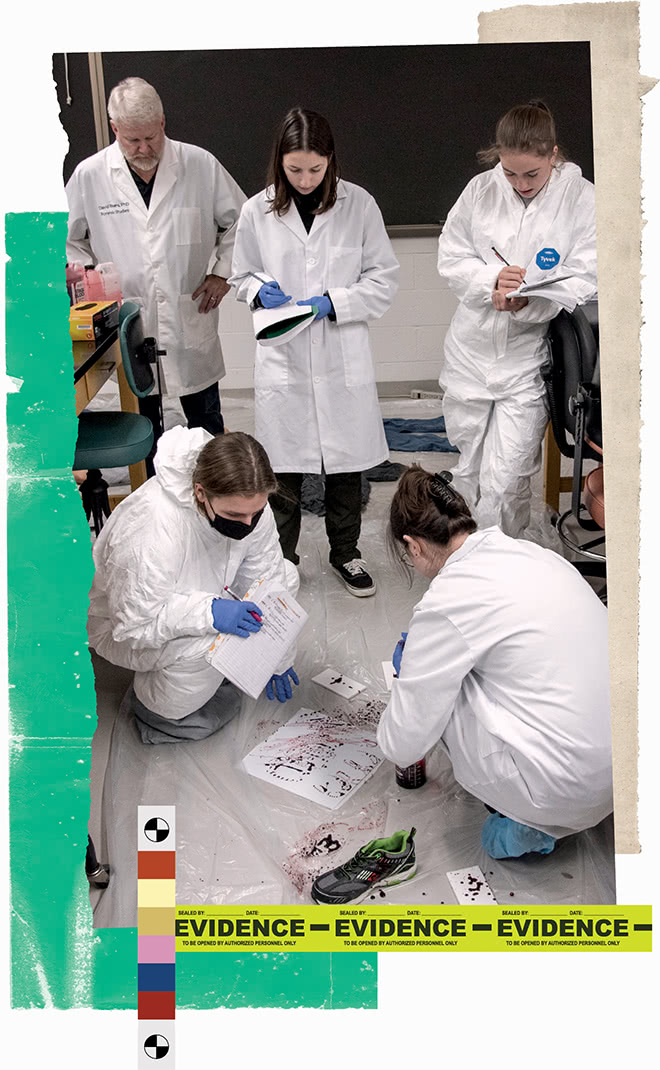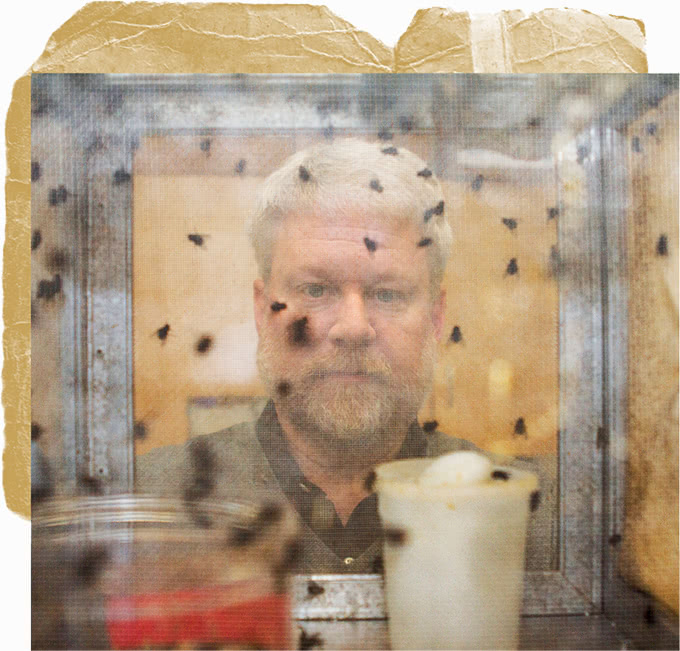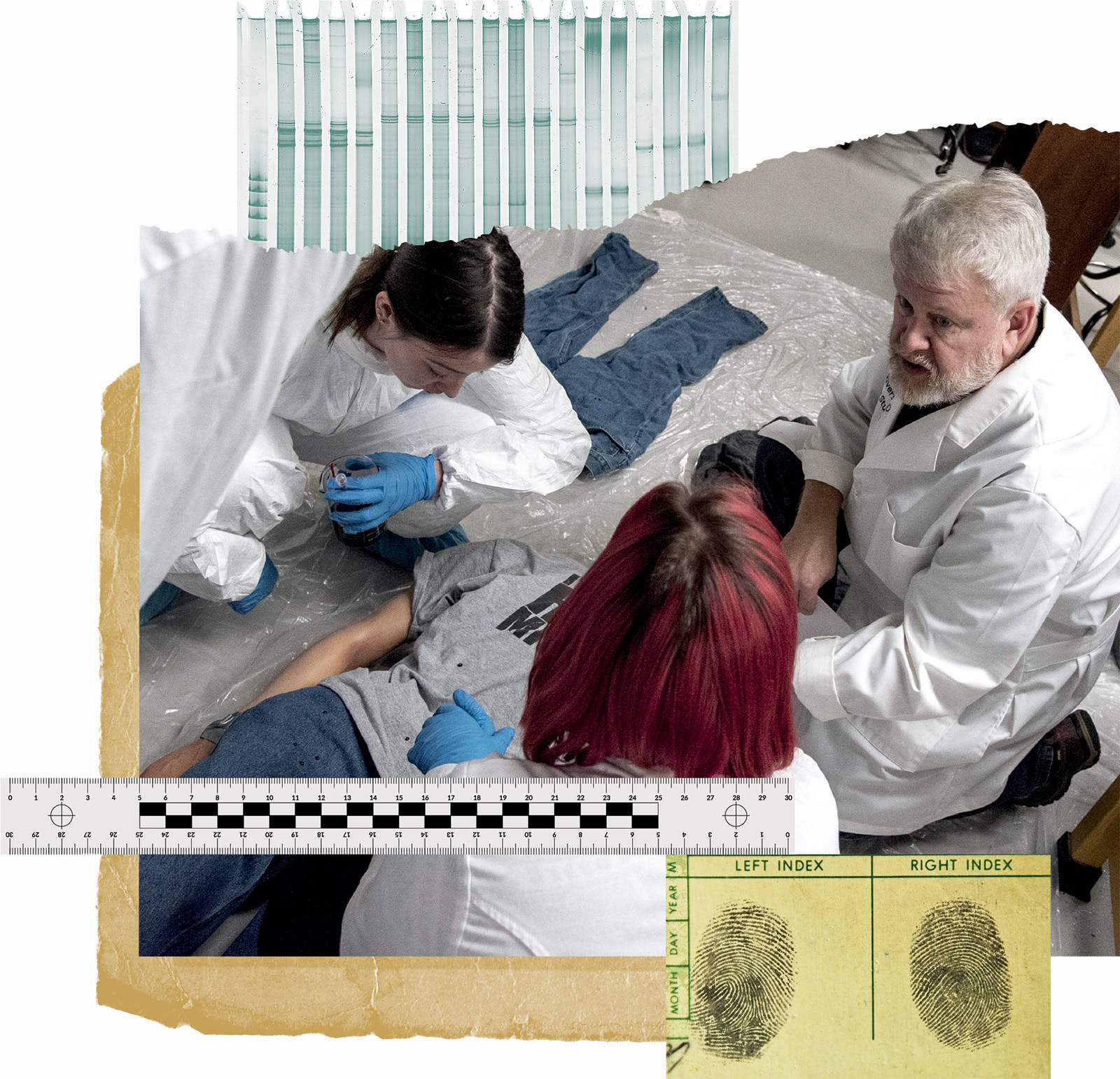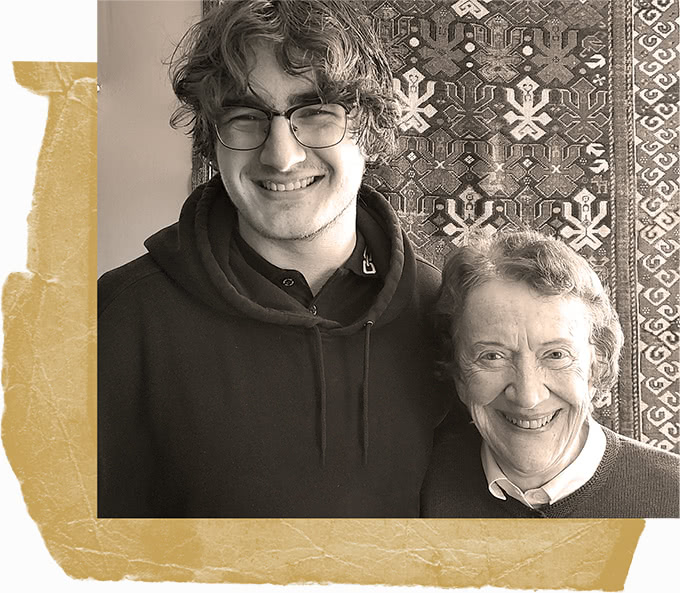
Loyola’s Forensic Science degree prepares students for rapidly growing field
Expert faculty teach students in the top region for forensic work
Jessica Goldstein
Jack Gregorian,’23, has always been interested in insects. On his family’s annual summer trip to their cottage in Lake Winola, Pennsylvania, he would run down to the water’s edge to examine whatever bugs he could find before his family had even unpacked the car.
As a first-year student at Loyola many years later, the Newton, Massachusetts, resident found his way to forensics. And he discovered he could combine insects and forensics in one fulfilling career in a forensic entomology class with David Rivers, Ph.D., director of Forensic Science, graduate director of Forensic Pattern Analysis, and professor of biology.
Loyola offers both an undergraduate major and minor in Forensic Science and a Master of Science in Forensic Pattern Analysis that prepare students to enter the in-demand—and quickly growing—field of forensic science. In fact, Loyola’s undergraduate and graduate forensics programs were among the first of their kind in the country—and the first in the State of Maryland.
Loyola’s forensics programs, which apply knowledge, techniques, and technology to the investigation of crime and the courtroom, are among the most popular academic programs on campus.
 David Rivers, Ph.D., director of Forensic Science, graduate director of Forensic Pattern Analysis, and professor of biology, leads an instructional forensics lab. Photo credit: Louis Umerlik ’96
David Rivers, Ph.D., director of Forensic Science, graduate director of Forensic Pattern Analysis, and professor of biology, leads an instructional forensics lab. Photo credit: Louis Umerlik ’96
Forensic Science at Loyola is 100% aligned with the end goal of Jesuit education: to seek the truth.
—David Rivers, Ph.D., director of Forensic Science, graduate director of Forensic Pattern Analysis, and professor of biology
"Our Jesuit, liberal arts university is at its best when we are able to create and develop academic programs that are both of interest to students and beneficial to a growing field that really serves society," says Cheryl Moore-Thomas, Ph.D., interim provost and vice president for academic affairs.
"I love seeing the faculty and student excitement around Forensic Science, which offers so much as an interdisciplinary program that cultivates intellectual curiosity, inspires cutting-edge research, and applies scholarship to justice. Our Loyola community has been pleased and proud to watch the program grow."
The Future of Forensics
Rivers’ passion and ability to connect with alumni and partner experts have enabled Loyola to grow its forensics programs quickly and strategically during a time when the forensics field continues to expand. The U.S. Bureau of Labor Statistics predicts that the employment of forensic science technicians will grow by 11% over the next decade, much faster than other professions.
What’s more, Loyola students are poised for competitive careers in one of the top regions in the country for forensic work. In fact, the Baltimore-Washington, D.C., metro area is among the fastest-growing hubs for fields such as biotechnology and biohealth, forensic psychology and counseling, criminal investigation and justice, and counterterrorism.
Catching the Forensics Bug
But before a forensics program could be established at Loyola, Rivers had to discover the field of forensic entomology for himself.
It was through an entomology lab taught by his undergraduate animal zoology professor that he ended up discovering his own lifelong passion for insects. Then during his senior year, he heard a presentation on the use of insects in crime scene analysis, which he describes as another aha moment. He went on to earn his Ph.D. in entomology from Ohio State University.
 Photo credit: Nick Alexopulos, ’03, MBA ’16
Photo credit: Nick Alexopulos, ’03, MBA ’16
I have been putting Loyola’s philosophy of lifelong learning into action as I pursue my path of forensic entomology.
—David Rivers, Ph.D., director of Forensic Science, graduate director of Forensic Pattern Analysis, and professor of biology
“Loyola has been that place to allow me to combine teaching and research," says Rivers, who joined the faculty three decades ago. “I have been putting Loyola’s philosophy of lifelong learning into action as I pursue my path of forensic entomology.”
With forensic entomology, Rivers explains, you can garner evidence from insects that you can’t from other sources—and especially from flies. “Bodies decompose quickly, so after more than 72 hours from time of death, medical examiners’ techniques on the freshly dead decrease, and you need to depend on something else.” Like insects.
What started out as pure fascination for Rivers has become a calling to help bring closure and healing for bereaved families looking for answers.
Rivers has since co-authored two textbooks as he continues to pioneer research on a wide range of insect-related topics, including the potential impact of climate change on insect seasonality in relation to hibernation and corpse analysis, and the consideration that flies could possibly transfer DNA into a crime scene from several city blocks—or even miles—away.
The Growth of Forensics at Loyola
Rivers has gone on to create and develop the forensics programs at Loyola, beginning with a forensic entomology class, then adding a minor in 2010. After Forensic Science became one of the hottest minors on campus, Rivers was asked to start a major. He subsequently helped the University also launch the M.S. in Forensic Pattern Analysis.
The undergraduate major is interdisciplinary in nature, covering three broad areas of student interest in evidence, social sciences, and justice by incorporating 17 academic disciplines—the most of any program in the country.
“What gives me a lot of pride is the breadth of Loyola’s forensics studies program,” Rivers says. “Our students can tackle lots of problems. They have the background to have all points of view in a particular case and can pick different career pathways. Forensics studies at Loyola is 100% aligned with the end goal of Jesuit education: to seek the truth.”
The approach is resonating with students, as the major has grown exponentially within five years, from 13 students to more than 130.
A Versatile Degree
Valerie Greisman, ’20, a Forensic Science and biology/psychology double major, conducted research in Rivers’ lab and co-authored three research publications as a student. Since receiving a graduate degree in social work with a criminal justice specialization, she is serving as a social worker at Hearts & Homes for Youth, working with females in foster care who are often involved in the juvenile or adult criminal justice system.
 Photo credit: Louis Umerlik ’96.
Photo credit: Louis Umerlik ’96.
Dr. Rivers has taught us so much. He’s a marvelous, inspiring teacher. Not many schools teach entomology and forensics. Loyola stands out by offering those classes.
—Ann Wolbert Burgess, D.N.Sc., a world- renowned forensic nurse and professor at Boston College
“Because my career goals are focused on working with individuals who are incarcerated, preparing for release, and welcoming them back into the community, my undergraduate and graduate education in forensics have provided me with an understanding of this population and the systems I work in,” Greisman says.
Cierra Thurmond, ’20, found her place in a critical role in the Baltimore Police Department. At a forensics class field trip viewing autopsies at the office of the chief medical examiner, she met a police detective sergeant who offered her an internship fingerprinting unidentified homicide victims. Today she works as a detective in a specialized drug unit.
Loyola’s forensics program has prepared Thurmond to observe and analyze evidence in crime scenes. In a larger sense, she says “Loyola’s forensics program led me to where I am.”
Meeting a Need
Most recently, the master’s program was launched at Loyola after feedback from Rivers’ advisory board made it clear there was a strong need in the workforce for training in forensic pattern evidence analysis.
“The field was desperately in need of this program,” says Rana DellaRocco, chief of science and evidence at the Baltimore Police Department and a Loyola affiliate professor who serves on the advisory board. “Pattern analysis is not something that new hires typically have any experience or knowledge of. This gives students a greater likelihood of success and gives labs the capability to hire and train examiners in pattern analysis in much shorter timeframes.”
A Family Bond in Forensics
At Loyola, Gregorian is matching his passion with a career path—with a nod to his grandmother, who first witnessed his love of bugs on those summer lake trips and has since become “a huge inspiration.”

With forensic entomology, you can garner evidence from insects that you can’t from other sources— and especially from flies.
—David Rivers, Ph.D., director of Forensic Science, graduate director of Forensic Pattern Analysis, and professor of biology
That’s because Gregorian’s grandmother is Ann Wolbert Burgess, D.N.Sc., a world-renowned forensic nurse and professor at Boston College. In the 1970s, Burgess’ research with rape victims connected her to the FBI; she later became involved in profiling for homicides. She has since worked nearly every high-profile serial killer case in the United States, as well as pursued Ted Kaczynski, the Unabomber. The Netflix series Mindhunter’s main character, Wendy Carr, was based on Burgess.
“This is a grandmother who loves her grandson. To be mentored by one of the world's top authorities at such an early age and the bond they share are incredible,” says Rivers. “The subject matter—forensic science and death investigation—doesn’t matter. It drew them closer.”
Gregorian has since thrived in Loyola’s forensics program, with Burgess’ and Rivers’ support. He is completing two forensics internships as he prepares for graduation in May. He plans to continue gathering more experience in the field as a forensic analyst before pursuing graduate school.
What’s more, he has connected Loyola faculty with Burgess’ projects. Thanks to Gregorian’s introductions, Rivers, DellaRocco, and Jen Lowry, Ph.D., associate department chair and associate professor of psychology, have joined Burgess and Gregorian in Super Sleuths. This collection of forensic practitioners and law enforcement help solve cold cases—sometimes including high-profiles ones like with Adnan Syed, featured in the popular podcast Serial. Rivers provided the lab project for Burgess’ summer program, which Gregorian participated in—and the Loyola/Boston College collaborations continue.
The respect, Burgess says, is mutual. “I never knew how important insects would be to forensics. Dr. Rivers has taught us so much. He’s a marvelous, inspiring teacher. Not many schools teach entomology and forensics. Loyola stands out by offering those classes.”

Alumni Help Shape Forensics at Loyola
The forensics program at Loyola was formed and continues to develop with the guidance of many experts, including from alumni who have been successful in roles connected to the field. These alumni have contributed by serving as members of Loyola's Forensics Studies Advisory Board, mentoring students, or providing insight for the program and course development.
David Black, Ph.D., ’74, graduated with a degree in biology after serving in Vietnam. His time at Loyola helped lay the foundation for his career path by teaching him to ask why. "Follow facts, not opinions," he says. “The scientific method is essential to answer scientific questions. Science cannot be rushed.” Black went on to earn a doctorate in forensic toxicology and joined the Vanderbilt University faculty. He founded Aegis Sciences Corporation—an internationally known forensic company, where he served as chairman and CEO until 2016. He has advised sports organizations and Fortune 500 companies on substance abuse prevention and testing, and he has testified as an expert witness in more than 40 states and on five continents.
Maura DeJoseph, ’98, who earned her degree in biology, performed autopsies as part of a pathology residency after medical school. “I realized that I could use every ounce of my medical education to diagnose, through an autopsy, the disease or injury that caused someone's death.” She has worked her way up in medical examiner offices. For the past decade, she has served as the deputy chief medical examiner in Connecticut. DeJoseph has certainly not forgotten her alma mater. “The embedded core elements at Loyola of liberal arts, academic rigor in the sciences, and service to community made me well-rounded and well-prepared for hard work and perseverance.”
Growing up, Becky Feldman, '98, was always interested in psychology, but it was at Loyola where she discovered forensic psychology. She was inspired by a psychologist guest speaker who got a law degree first—a step she would go on to choose for herself. Feldman’s career has focused on prison reform and getting people out of prison who can safely return to the community. “I have personally secured the release of 75 people from prison who after 20-50 years are ready to go back into society,” Feldman says. “That’s my legacy." Life has come full circle for Feldman as Rivers sought out her expertise from the perspective of a psychology major with a nontraditional career path. “I’m happy to talk with students. Loyola was a transformative experience for me—it put me on my path,” Feldman says.
Matthew Gabriel, '95, experienced some pivotal TV moments in college—notably watching the crime show Homicide and the O.J. Simpson vehicle chase—that first piqued his interest in forensics. Gabriel, who earned his degree in biology, went on to get his master’s in forensic science, and now he is a senior leader for Thermo Fisher Scientific, one of the leading producers of equipment for forensic DNA analysis. He has testified as an expert in DNA analysis more than 40 times in criminal courts and holds one case particularly close, which resulted in the arrest and conviction of the 1976 cold case homicide of Jenny Read. “It was rewarding and emotional to see my daily work bring closure to this family’s tragic loss.” Gabriel remembers what it was like figuring out his way forward as the profession of forensics was just beginning. “Now that forensics ‘has arrived,’ I can share my career path and experiences for those students asking themselves similar questions.”